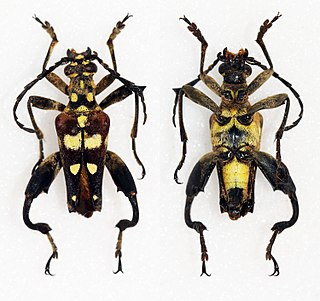
The Prioninae are a subfamily of Cerambycidae. They are typically large (25–70 mm) and usually brown or black. The males of a few genera sport large mandibles that are used in fights with other males, similar to stag beetles. These beetles are commonly nocturnal and are attracted to light. The majority of the Prioninae whose biology is known are borers whose larvae feed on rotting wood or roots.

Cerambycinae is a subfamily of the longhorn beetle family (Cerambycidae). The subfamily has a world-wide distribution including: Asia, Europe and the Americas. Within the family, the only subfamily of comparable diversity is the Lamiinae.

Lampetis is a genus of beetles in the family Buprestidae, containing the following species:

Paracupta is a genus of beetles in the family Buprestidae, containing the following species:

Polybothris is a genus of beetles in the family Buprestidae, containing the following species:
Eurydera is a genus in the beetle family Carabidae. There are more than 30 described species in Eurydera, found in Madagascar.

Cerambycini is a tribe of longhorn beetles classified under the subfamily Cerambycinae.

Abacetus is a genus of beetles in the family Carabidae, distributed across Africa, Asia and Australia, with a single European species. It contains the following species:

Eucamptognathus is a genus of beetles in the family Carabidae, containing the following species:

Callidiopini is a tribe of longhorn beetles in the subfamily Cerambycinae.
Copelatus vigintistriatus is a species of diving beetle. It is part of the subfamily Copelatinae in the family Dytiscidae. It was described by Fairmaire in 1869.

Epicauta is a genus of beetles in the blister beetle family, Meloidae. The genus was first scientifically described in 1834 by Pierre François Marie Auguste Dejean. Epicauta is distributed nearly worldwide, with species native to all continents except Australia and Antarctica. Surveys have found the genus to be particularly diverse in northern Arizona in the United States. Few species occur in the Arctic, with none farther north than the southern edge of the Northwest Territories, Canada.
Eucamptognathus alluaudi is a species of ground beetle in the subfamily Pterostichinae. It was described by Fairmaire in 1895.
Eucamptognathus tenuistriatus is a species of ground beetle in the subfamily Pterostichinae. It was described by Fairmaire in 1895.
Eucamptognathus brevicornis is a species of ground beetle in the subfamily Pterostichinae. It was described by Fairmaire in 1869.
Eucamptognathus chaudoirii is a species of ground beetle in the subfamily Pterostichinae. It was described by Fairmaire in 1868.

Eucamptognathus opacus is a species of ground beetle in the subfamily Pterostichinae. It was described by Fairmaire in 1892.

Crossotus is a genus of longhorn beetles of the subfamily Lamiinae.
Megalofrea humeralis is a species of beetle in the family Cerambycidae. It was described by Vollehoven in 1869. It is known from Madagascar.

The Apatophyseini are a tribe of longhorn beetles erected by Lacordaire in 1869. They are placed in the monotypic subfamily Apatophyseinae.










